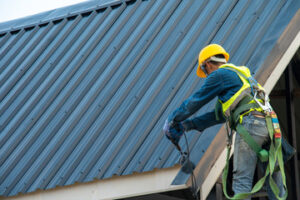Roofer Wilmington DE also known as a roofing contractor or roof mechanic, is someone who repairs or installs the roofs of buildings. These structures can be domestic or commercial.

People in this career usually have significant physical stamina to perform their duties. This is because they frequently work outdoors in varying weather conditions, including rain or snow.
Whether it’s protecting homes, businesses, or hospitals, roofs are essential. And when something goes wrong, the right person needs to fix it quickly and safely. That’s where a roofer comes in. They install, repair, and replace roofs and skylight windows. They also re-slate and tile roofs and fit lead sheeting and cladding. They must be physically fit and have a good sense of balance to be able to work at heights, often in extreme weather conditions. They may also need to complete additional certifications to build their skillset.
To become a roofer, you can earn your high school diploma or equivalent and then attend trade school to learn the practical aspects of the job. However, many people also find that an apprenticeship is a great way to learn the ropes and gain valuable on the job experience. It’s also possible to complete a college course that teaches you about the relevant construction practices.
Once you have the necessary qualifications, you can apply for a roofer’s license. You’ll need to pass an examination and submit the required documentation in order to fulfill all of the requirements. Some states also have specific licensing requirements for roofers who work with asbestos or other hazardous materials. You should check with your local government to learn more about the specific requirements in your area. It’s also a good idea to ask potential roofing contractors for a list of their certifications before you hire them. This will ensure that you’re working with a qualified and appropriate professional who has all of the safety protocols in place.
Job Duties
A roofer professionally builds, inspects, repairs, replaces and maintains roofs for residential and commercial structures. This profession requires extensive knowledge of materials, construction techniques and building codes. It also involves working with a variety of tools and machinery, including electric power saws and grinders. Roofing work can be hazardous due to the heights at which it is performed, so roofers must undergo extensive training to ensure their safety. This includes working safely with hot substances and using fall protection equipment.
Roofers typically spend most of their time performing routine maintenance and repairs on existing roofs. This often involves responding to customer call-outs after storms, repairing rotten joists or replacing missing shingles. Some roofers also construct and repair roofs on new buildings, which can require them to travel between jobsites and site locations.
For those who choose to pursue certification, the journeyperson certificate can be obtained after completing a four-year apprenticeship program. This involves on-the-job training, technical training and passing exams. This qualification can help you gain a better job, as it shows employers that you have completed the required educational requirements for your career.
Other duties include providing customers with estimates on labor costs for fixing or constructing a new roof. This also entails helping clients select appropriate roofing materials and explaining the benefits of different types of roof systems. Other important tasks include preparing surfaces for laying tiles and shingle, cutting and positioning the materials with hand tools, and removing old shingles and other materials. Roofers must also be able to read and interpret blueprints, engineering drawings and specifications for installing and maintaining roof systems.
A roofer typically works a standard 40-hour work week, but this can be increased during peak periods and seasonal weather conditions. They must be able to stand for long periods on ladders or scaffolding while performing their duties, and may need to lift heavy materials. These professionals are required to wear protective clothing, including goggles and masks. They also must be able to work in inclement weather, such as wind, rain and snow. Moreover, they must be familiar with the proper use of hand and power tools, such as shovels, rakes, cutters and shears.
Requirements
Some states require roofers to have a license, certification or registration. To obtain one, you may need to pass a test or complete an apprenticeship, and you must renew it on a regular basis. Workers who use ladders must be trained in safe usage to prevent injuries and accidents. They must maintain three points of contact with the ladder at all times and always face the ladder when climbing up or down. Employers must also provide fall protection for roofers, such as safety nets and personal fall arrest systems (PFAS) including harnesses and lanyards.